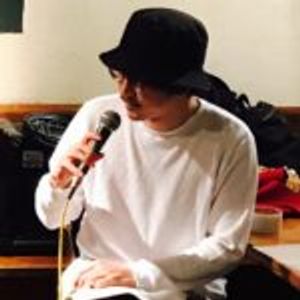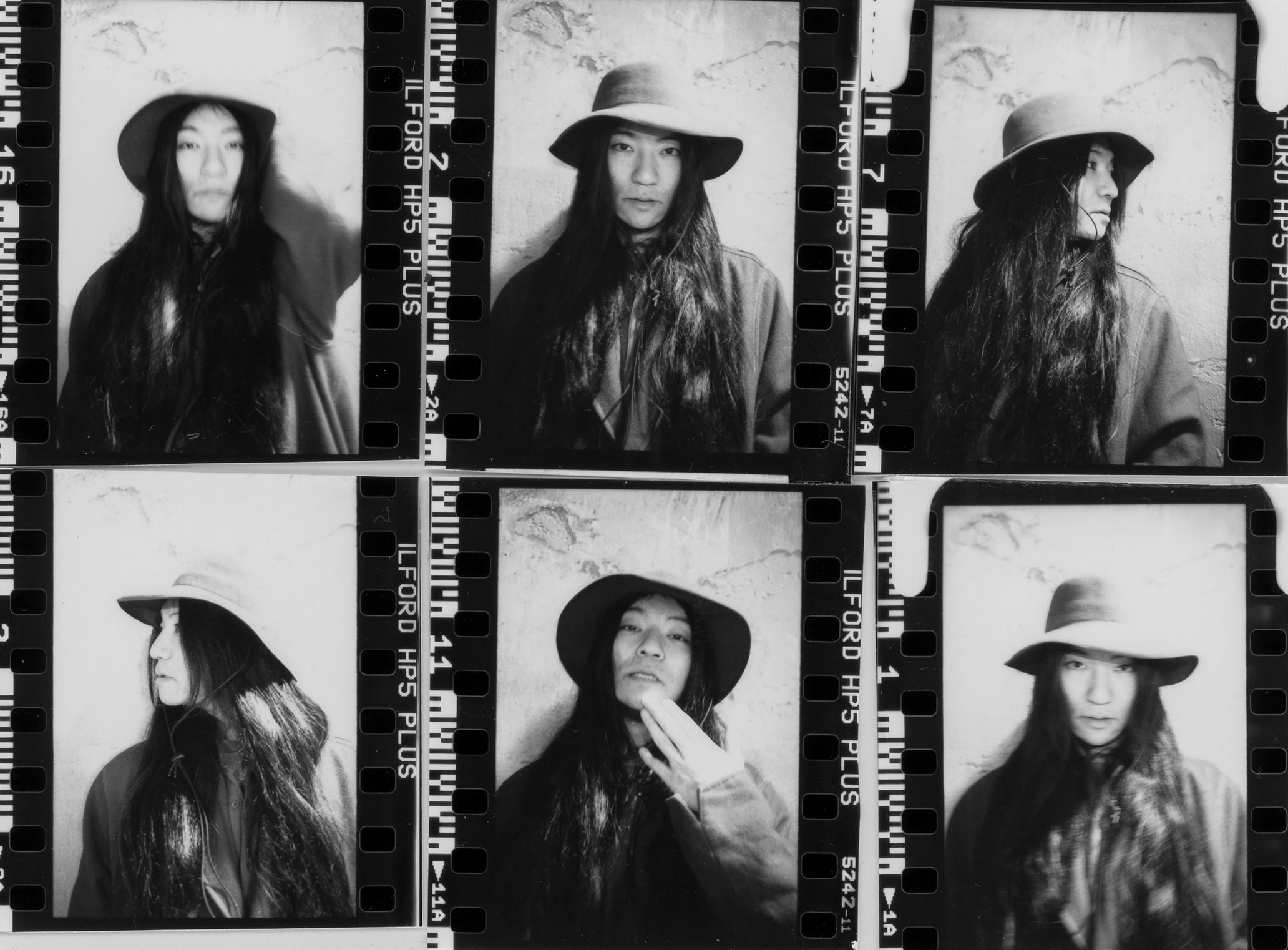
GEZAN
Formed in Osaka in 2009, GEZAN is an alternative rock band consisting of Mahito the People (vo., gt.), Eagle Taka (gt.), Yakumoa (ba.), and Roscal Ishihara (dr.). In 2012, the band moved its base to Tokyo and has been active throughout Japan based on its unique perspective. They run Jusangatsu, a label that sends out a variety of domestic and international talent. Since 2014, they have been holding the “Zenkankaku-Sai Festival,” a donation-based outdoor festival organized by Jusangatsu, which is free admission, with the idea of “letting people decide the value of fun for themselves.” The band released their fifth full-length album KLUE in January 2020, and in May 2021, they were joined by a new bassist, Yakumoa, and performed in “FUJI ROCK FESTIVAL”. The band released their first full-length album in three years, Anochi, produced with Million Wish Collective, on February 1, 2023.
http://gezan.net
Twitter:@gezan_official
http://mahitothepeople.com
Twitter:@1__gezan__3
Instagram:@mahitothepeople___gezan
February 24, 2023 marks one year since the start of Russia’s invasion of Ukraine. Why do human beings walk into an extremely tragic war? Not a few people must have lived their lives wondering how to overcome the worst of the situation, but feeling helpless and powerless to do anything about it. It is against this backdrop that GEZAN’s new album, Anochi, was released.
Even though it does not have the power to directly stop the war, the anti-war rally “No War 0305” organized by GEZAN’s own label “Jusangatsu” in March 2022 had great significance. Of course, anti-war demonstrations were held in various places. But most of them were organized under the slogans like “with Ukraine” or “anti-Putin.” This is not to say that they are wrong, but the logic of friend/foe itself has a dangerously close resemblance to the logic of war. In contrast, the focus of “No War 0305” was simply “anti-war.” Whereas one of the so-called powers of music is to unite people’s bodies and souls, this rally existed as a place where diverse opinions coexisted as they were, yet still offered a glimpse of the possibilities of solidarity through music.
The music of Anochi is also full of diverse and complex sounds and voices. It can be described as rebel music of a new era. At first glance, it sounds like an anti-war album, but Mahito the People says, “They are not protest songs.” The interview explores what exactly this album is.
A cry of anger and a prayer for hope
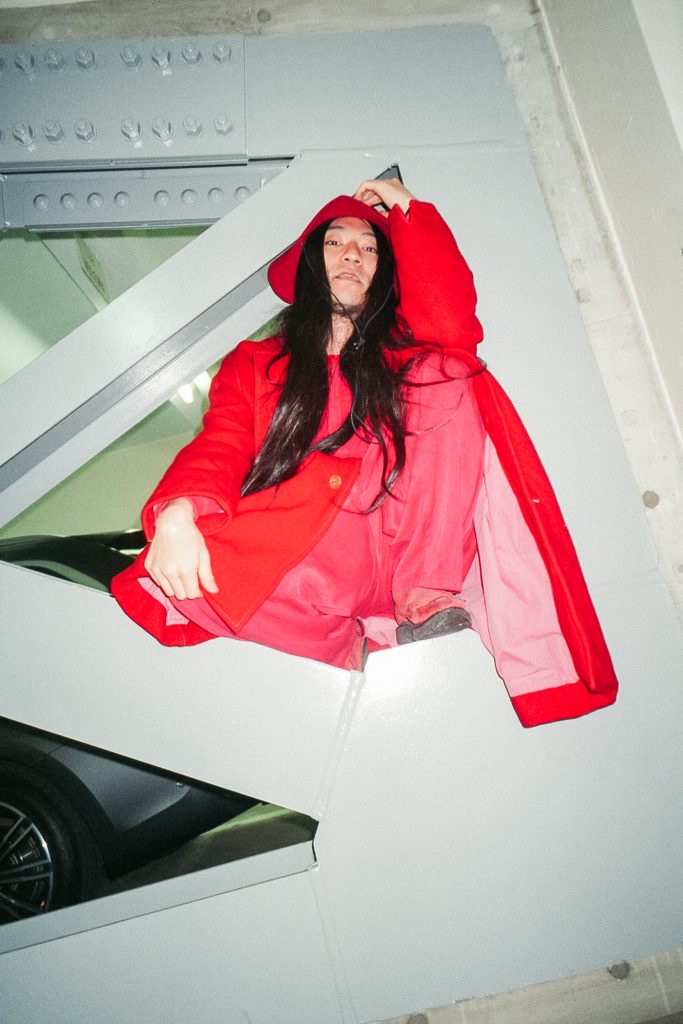
–The theme of Anochi, which you created with the voice ensemble Million Wish Collective, is “voice.” However, even within the same theme, the first half of the album is charged with a sense of anger and screaming, while the second half, which is more like a prayer, seems somewhat more hopeful. If the first half is a real voice emanating from the streets, the second half can be seen as a science fiction-like world that offers a futuristic and panoramic perspective on what is going on now. What was the concept behind this dualistic composition?
Mahito the People (Mahito): I think that the various events you mentioned earlier (in the first part), such as the pandemic and the war, would be completely unrealistic to people in the time before they happened. Rather, they would probably think all these are the stuff of science fiction. No one would have predicted in the 2010s that Shinzo Abe would be gunned down. In other words, the reality is already in the world of science fiction. So, even if I am just doing my music, I have no choice but to work on a piece that has science fiction-kind of sounds.
In terms of movies, for example, old science fiction like E.T. (1982) was predominantly centered on earthlings, and the story was about human beings meeting aliens, but now, works like Blade Runner 2049 (2017) depict the viewpoint of replicants. In a way, the film focuses on what was said to be “the other side.” In such films, we are not looking at them, but we are looked at by them. In such films, we are not seeing them, but being seen by them. So this process seems natural to me since at least science fiction is already free from the genre of glimpsing the “other side” and we are in such a confused and unknown zone.
We are also at the point of no return on the issue of climate change, but what is happening is a problem that cannot be grasped by individual human beings, unless it is measured over a very long span of time. But we have to face it. In a sense, the way to face this reality is to have a science fiction perspective. The same is true of the end of the planet Earth. If we start using nuclear weapons in a war, it will definitely break down, but now the danger has become so real that it doesn’t even seem like a far-fetched fantasy. So I thought it would be hard to face the reality of a science fiction-like situation without thinking about it through a street sensibility.
However, the fact that the second half of the album sounds more hopeful means that the world is clearly more chaotic than when I made KLUE, and that I have also been driven into a tougher situation. I didn’t want to depict that realistically in the midst of the sense of stagnation. I wanted to lie properly. The percentage of hope contained in Anochi is also a reflection of how distorted the world I am looking at is. I needed to say that there is hope, because when you are running after hope even your feelings become clearer.
Thoughts behind “No War 0305”
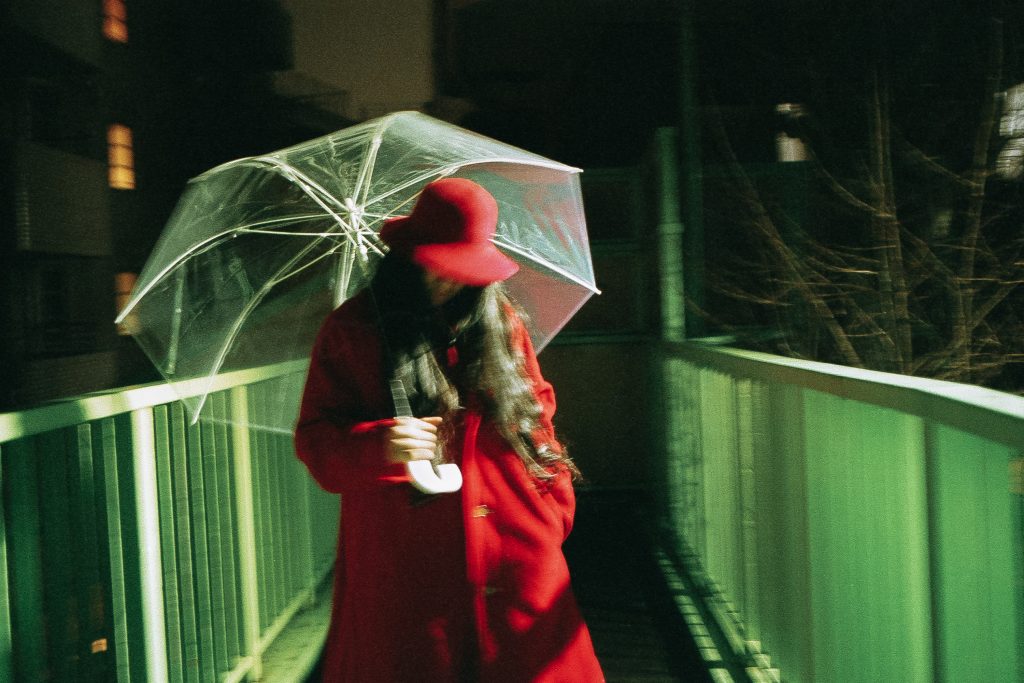
—Anochi is infused with strong anti-war sentiments, yet it is slightly different from what is called an anti-war album. Instead of upholding a specific ideology as it is, it seems this rebel music was created as a result of profound reflections on why anti-war/peace is necessary and on how human beings are living. How did the Russian invasion of Ukraine and “No War 0305” held at the south exit of Shinjuku affect the production of this album?
Mahito: I always think that I don’t want to judge people by some kind of symbols because the times we are living are so complicated that it is dangerous to make any clear statements. Everyone has a different background and sees different things, so it is not so simple to say that one side is an enemy and the other side is a friend. We sometimes use symbols to make discussions easier to understand, but that is not the right way to make judgements about others. With this in mind, I think even the symbol “I” is impossible. There are many other beings, including fungi, wriggling around inside me, and even if there is only one word or feeling that comes out on the surface, there are many thoughts and feelings behind it. There are angels and demons, but through a kind of small democracy, the first person “I” plays the role of being responsible for them. That is how messed up everyone is, and there is no way to categorize anyone.
So, while I don’t want to divide people into categories and foment fragmentation among them, even so, there would be no room for debate about “Anti-War”. As I wrote in my statement for “No War 0305,” I didn’t mean to talk about nationalism, insisting that Ukraine is all right and Russia is all wrong. There are many opinions, but at least there is no justification for people to kill other people, right? I thought it is worth getting together even for that, and that this feeling should be expressed more frankly. The symbol “No War” is used as a political term, but I think it should be used in the same way as “Love” or “Peace,” or even as a synonym. On top of that, it is not even a genre, considering how close it is to our lives and that everyone is a party to it, without exception. So, rather than clearly stating my principles and opinions, which will potentially divide people, I wanted to at least liberate our senses more.
That is also what I did with this album. So I don’t think of it as an anti-war album at all. Well, you can say that all the songs touch on something similar to that, but as I said, even love songs can also do so. It’s no different from affirming life.
–So, you are saying that even the song that cries out “Fight War Not Wars” is, in a sense, not a protest song, right?
Mahito: Yes. I don’t think it is even necessary to push it into such a genre. At the time of “No War 0305,” for example, Ayano Kaneko and Ikuko (Harada) did not assert anything in their stage banter, they just stood on stage and sang the songs they always sing and left, but I think that was rather very important. For me, it was like, why can’t we do what we usually do in a usual way? Why is it that when there is a war, people say, “No, no, each of us has our own position, ……” and get stuck? It’s not a question of position or anything, but from a primitive sense, war sucks without argument. So this album does not feel like a collection of protest songs at all, maybe it is even less protest-oriented than KLUE.
–What struck me about “No War 0305” was that even though Ayano Kaneko did not sing an anti-war song, the phrase “You will never get me, my tears are overflowing” in her song “爛漫(Ranman)” sounded as very sincere words. There were a lot of moments like that. So I thought that the very fact that “Anochi” is not a protest song, is exactly what connects the song deeply to politics that is different from ideology.
Mahito: Yes, right before we did “No War 0305,” I ran into a musician at a pub who said, “I can only sing love songs, so I can’t participate in the demo. But then I thought to myself, “No, no, no, you should think about how it is possible to sing love songs or to be in love. If peace is not guaranteed, how can we do all these things?” As you can see from these examples, many things, which do not seem to be related to “No War,” are linked to it. Or rather, many activities are allowed only in times when there is no war.
So it is not even about whether you are directly protesting or not. Spending time at home with your cat, drinking coffee, or taking a walk with someone you love are all connected to “No War.” One of the purposes of “No War 0305” was to show the three-dimensionality of such things, and in fact, I think the scope of the word itself should be expanded more. But I think more and more people are becoming aware of such things. Yuta Orisaka tweeted at the beginning of this year, “I wish you all a happy New Year. No War.” I think this word should be used as frankly as that
The contemporariness reflected in the music
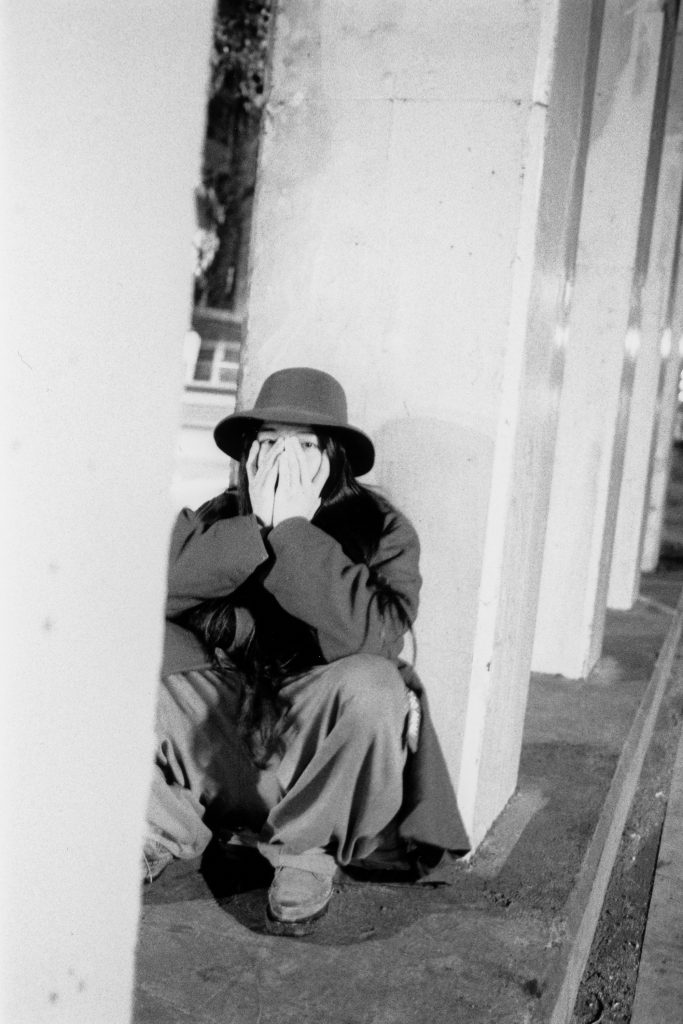
— Some listeners seemed to associate this “Anochi” with, for example, Nanao Tabito’s “911FANTASIA”. What kind of rebel music have you yourself been influenced by or like to listen to?
Mahito: It may be totally different, but I sometimes feel a sense of reality when I listen to Nina Simone. When Maki Asakawa mentioned Nina Simone, she said something like, “Jazz is the body heat of black people,” and to me, the way she was breathing and the way she was there itself seemed like rebel music. I feel the same way when I listen to her music now. I think we should pay more attention to things like human breath. Nowadays, people tend to pay more attention to symbolic things. The act of having AI draw pictures is very popular, but from my point of view, it is not funny at all. If that thing evolves, in a few years there will be no more jobs for illustrators. The same thing is happening with music. In the not-too-distant future, songs written by AI will be comparable to those written by humans. Not only that, but the amount of learning that AI is capable of will far surpass that of humans. In other words, unless what is called culture takes responsibility and prepares to properly call beautiful what such symbolic manipulation cannot do, we will not be able to find the meaning of being human. That is why the AI boom is not funny at all.
For example, in Yoko Ono’s installation, The Blue Room Event, there is a line drawn, and below the line are the words, “This is part of a very large circle.” It is said that humans cannot draw a straight line, that even when we think we are drawing a straight line, the left and right sides of the line are slightly off, and that if we stretch it out, it becomes a circle. I think the strength of human beings lies in this inability to draw straight lines. I would have to say that there is potential in such strength, ambiguity, and imperfection.
–Nina Simone is also known for her quote, “An artist’s duty is to reflect the times.” Some people argue that musicians should just focus on making music, but do you share Nina Simone’s stance?
Mahito: Of course, I sympathize with Nina Simone’s stance, and I don’t know how I can create a sound that has nothing to do with the times. Whether you have words or not, you must have lived through this time, been hit by the same rain, been frightened by the same invisible virus, and felt the same sense of entrapment. I don’t know how you can remain irrelevant in the midst of it all. If I stay cooped up in my house all the time and produce music with the blackout curtains closed, even when missiles are flying outside or it is raining, maybe I can remain irrelevant to the outside world, but I can’t even imagine it.
I also wonder why those who insist that musicians should just make music cannot realize that even what is made in this way will reflect the contemporariness. And I think the attempt to ignore the contemporariness is, in itself, an expression that reflects the times as a reaction against it. I believe that not only facing the times hand in hand, but also distancing oneself from the times, or being out of step with the times, is also part of a relationship with the times. This is the same as what I mentioned earlier about the song sung by Ayano Kaneko embodying “No War.” There are not only straightforward ways of relating to the times, such as facing in the same direction or moving forward together, but also diverse and complex ways of relating. So, from that perspective, no one can be unrelated to the times.
I think it is narrow-minded to insist that musicians should just focus on making music. If you take that a little differently, you end up with something like “a careful and mindful life,” which is a lifestyle that only aristocratic people are allowed to have, but even such people could not have been unaffected by the pandemic and the war. Obviously, Anochi also reflects the times. However, as for me, I did not try to confront the times, but only to find a struggle within myself and focus on something like hope.
Experiences gained from involvement with the Ainu people
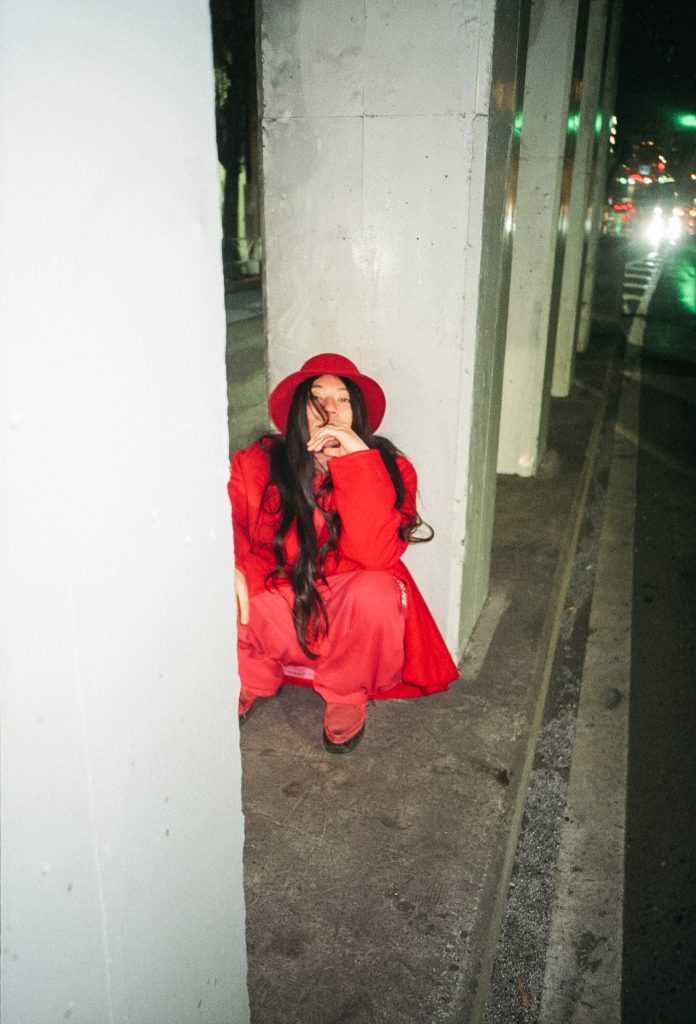
–Was your relationship with the Ainu people and the Utasa Festival in which GEZAN performed a major part of the source of inspiration for the making of Anochi?
Mahito: Yes, indeed.
–When did your involvement with the Ainu people begin?
Mahito: The first time was three years ago when I went to the first Utasa Festival in 2020. I was shocked at how close people were to the music. I am a musician, so usually I am singing on stage and there is an audience listening to it, but in the Ainu Upopo (one of the traditional forms of Ainu group singing), there is no boundary between singer and non-singer, professional and amateur, on and off. and the distance between the singer and the song is shocking. That close distance to the music was shocking and very interesting. Moreover, they are singing songs collectively and psychedelically, and I was simply drawn to them musically. The way Ainu people interact with songs seemed really new to me.
Bon Odori may be similar. Partly because of my occupation, I have a kind of obsessive thoughts about my identity, like “I have to be unique,” but when I become a part of everyone going around in a circle like that, I feel like I’m free from that kind of obsession. I don’t have to stand out, I just have to be part of the circle. It reminds me of a kind of animism, a sense of being one with nature, and it felt good. That is how I fell in love with Ainu’s songs.
–How does the experience you gained from your relationship with the Ainu flow through Anochi?
Mahito: Of course, I am the vocalist and tell the words as a storyteller, but a different story continues through the chorus. But there are actually many layers like these in the real world too. For example, there is the time ticked by the second hand of a clock. However, if you step outside, the season is slowly changing toward spring. There is also the time that the biological clock ticks inside me, and there is the time of my life span. There is also the speed at which the memory of the Utasa Festival that I saw the day before yesterday (February 5) is gradually becoming a memory. We live in a world where these multiple times coexist.
It is absolutely wrong to say that we live only in one mechanical chronological time, in fact, we all manage to live in multiple time periods. In Anochi in particular, I was conscious of the fact that multiple time frames revolve in an overlapping manner. This way of thinking was derived from the time I spent with the Ainu people at the Utasa Festival.
–By the way, I am not familiar with the word “Anochi” in the title. Is it related to the Ainu culture?
Mahito: No, it has nothing to do with it (laughs).
— Could you explain the origin of this term?
Mahito: For me, it is a kind of sense of the birth of something like a single living organism. For example, the komainu (guardian dogs) at shrines and temples have an “A” (open) and an “N” (closed) mouth, so they form a pair. Actually, this relationship between “A” and “N” implies life and death. And the “A” is the sound of the beginning. That’s why I wanted to put “a” there.
Re-encountering for the Zenkankaku-Sai Festival
–I see, I understand. Finally, I would like to ask you about the Zenkankaku-sai Festival (Festival of All Senses), do you plan to hold it in 2023?
Mahito: I would like to say that we will do it this year. We haven’t made any progress yet, but we will definitely do it. After all, in terms of what we lost during the pandemic, it was also significant that the festival crew fell apart. We weren’t connected by a business contract, so the team was inevitably fractured by the change in environment. So we have to re-encounter people properly to get a fresh start. I hope that anyone reading this now who has the passion to do so will meet with us. It is not so much that we need your help, but that we need to feel like we have been struck by lightning.
The song “Just Love,” which was included in the Anochi, has quite naive lyrics. The song goes, “I’ve been waiting for a night like this all my life / That’s why / I love to sing. I wrote those lyrics while imagining myself singing them at the Zenkankaku-Sai Festival. So I think “JUST LOVE” is not complete unless I sing it at the festival, and that is one of the reasons why I want to hold the festival this year.
–Do you think that also means that Matsuri (the Japanese form of the festival) is necessary for human beings?
Mahito: I do think so. Matsuris are different from so-called music festivals in that they are more integrated into our daily life, and they affect our lives before and after the matsuri. I do not want to present correctness, but rather to present the experience of an event that makes people’s cells perk up. The kind of live performance I love is like that, and there are many such experiences in our daily lives that are not even within the scope of music. Eating a meal can be one such experience. I feel that there is something inside me that I can only do at the Zenkankaku-Sai Festival because this festival is the only place where I can realize these things in a three-dimensional way. I think this is something that goes one step further than Anochi.
Photography Yuki Aizawa
Translation Shinichiro Sato

■ Anochi
Release date : February 1, 2023
Format : CD / Digital
Price : (CD) ¥3,300
TRACKLIST
1. A story before Life / (い)のちの一つ前のはなし
2. Chuken – Death Penalty Dog / 誅犬
3. Fight War Not Wars
4. We Can’t Take It Anymore / もう俺らは我慢できない
5. We All AFall
6. Tokyo Dub Story
7. SUITEN – INTERSECTION / 萃点
8. SORA TAPI WATASHI TAPI (bird talk) / そらたぴわたしたぴ(鳥話)
9. We Were The World
10. Third Summer of Love
11. Prelude to Finale Red caught Anochi’s eye / 終曲の前奏で赤と目があったあのち
12. JUST LOVE
13. Linda ReLinda / リンダリリンダ
https://gezan.lnk.to/ANOCHI

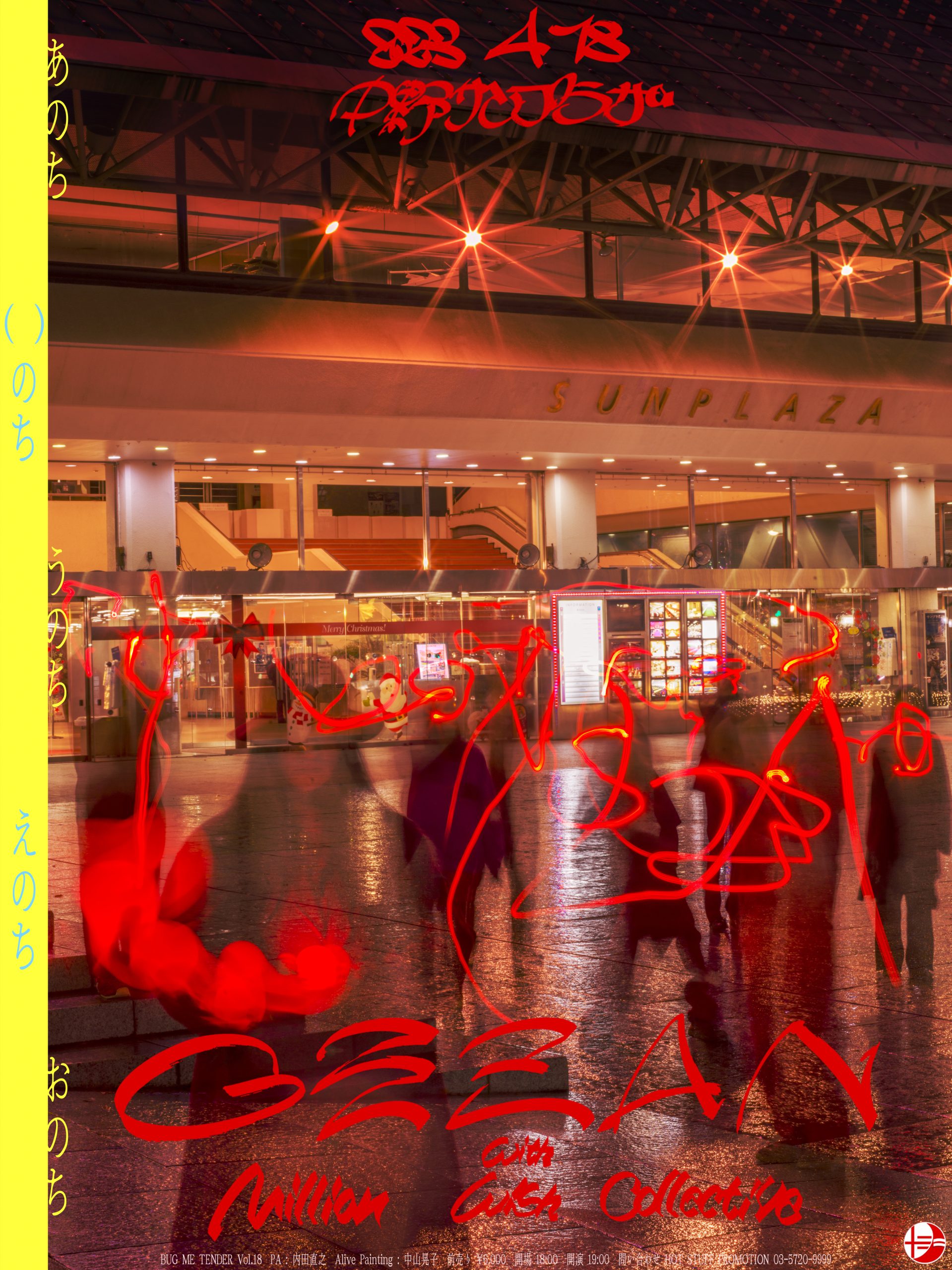
■Anochi release BODY LANGUAGE TOUR 2023
January 27, 2023 at WWW X, Shibuya, Tokyo
February 1, 2023 at Sound lab mole, Sapporo, Hokkaido
February 25, 2023 at FORCE, Hamamatsu, Shizuoka
March 2, 2023 at CLUB UPSET, Nagoya, Aichi
March 4, 2023 at UMEDA CLUB QUATTRO, Osaka
March 18, 2023 at LIVEHOUSE CB, Fukuoka
March 19, 2023 Hiroshima 4.14
March 21, 2023 at YEBISU YA PRO, Okayama
March 31, 2023 at F.A.D YOKOHAMA, Yokohama, Kanagawa WITH Soushi Sakiyama
April 2, 2023 at Saitama HEAVEN’S ROCK shintoshin VJ-3 / WITH Ohzora Kimishima trio
April 18, 2023 at Sunplaza Hall, Nakano, Tokyo
https://gezan.net/live/

